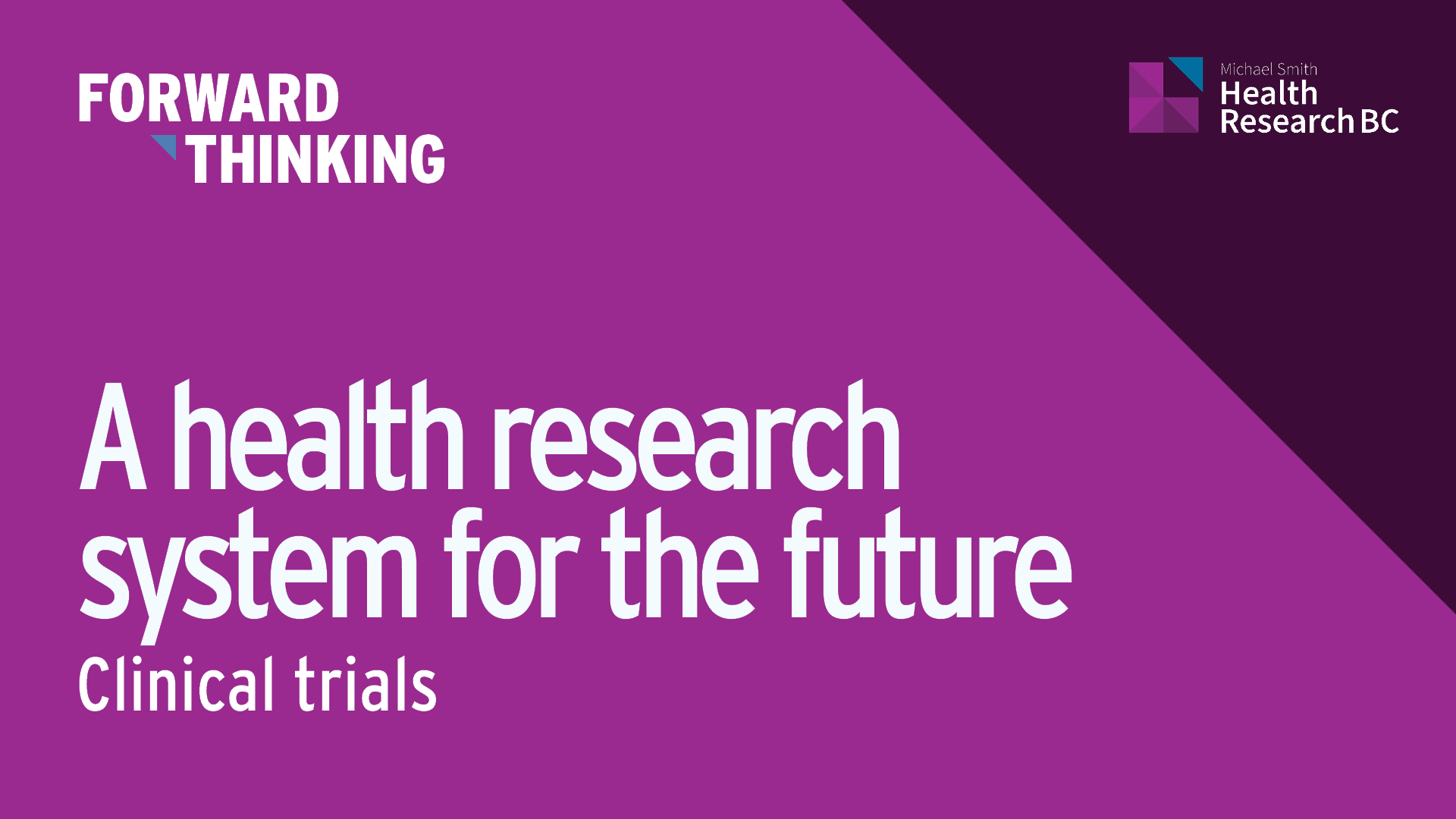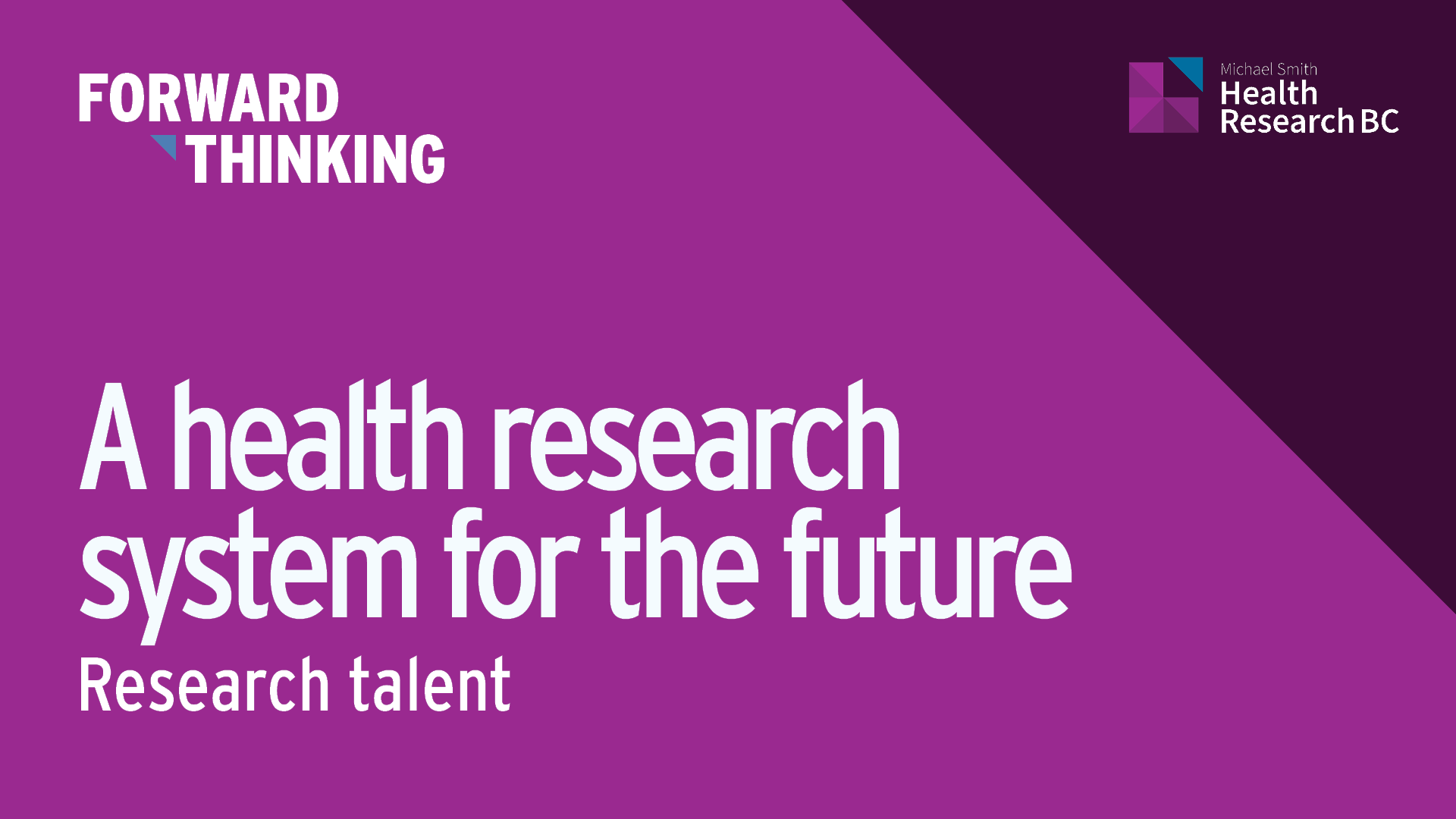Increasing value, reducing waste in research: What can funders do?
21 March 2018

As BC’s health research funding agency, we think deeply about how to grow, improve and best support BC health research. Over the coming weeks and months we will be sharing a series of blogs on health research funding and ‘helping-it-happen’. Second in the series is MSFHR’s President & CEO Dr. Bev Holmes, discussing what funders can do to reduce research waste.
Forward Thinking is MSFHR’s blog, rebranded to focus on what it takes to be a responsive and responsible research funder.
Increasing value, reducing waste in research: What can funders do?
In the introduction to a 2014 Lancet special issue on research, MacLeod and colleagues[1] argue that despite substantial health improvements attributable to biomedical and public health research, there are unacceptable levels of waste in the scientific enterprise.
The good news is that many of the reasons for this waste – relating to how research is prioritized, conducted, regulated, disseminated and reported – are well-understood and actionable. That’s the focus of the eminent journal’s series Research: Increasing Value, Reducing Waste: how funders, regulators, journals, academic institutions and researchers can help maximize critical investments in science.
As the Michael Smith Foundation for Health Research (MSFHR) hones our funding expertise (see the first post of our blog series), we’re paying close attention to the Lancet recommendations. For each of the areas below, covered in five separate Lancet articles, we’re asking: What are we already acting on? How are we monitoring the activity? What are we not doing that we could start doing? What is our role in encouraging others to take action?
Priority-setting
In the first article,[2] Chalmers et al argue that not enough research is based on questions of relevance to users of the evidence, potential outcomes are not always assessed, and up to 50 percent of studies don’t reference systematic reviews of existing evidence. Among the recommendations are more “research on research” to identify factors associated with successful replication of research and its translation. Funders, specifically, should be transparent about how they decide what research to support, and ensure that research proposals are justified by systematic reviews. They could also fund investigations into the effects of initiatives to engage potential research users in research prioritization. MSFHR is working on and learning from other funders about research on research (see for example National Institute for Health Research). We’re committed to developing and communicating a new investment strategy. Our peer review process ensures that knowledge is being advanced – not duplicated – by the researchers we support. Finally, our forthcoming public and patient engagement strategy outlines how these important stakeholders can enhance funders’ work, including priority-setting.
Research conduct
Ioannidis et al[3] cover research design, methods, and analysis. Among the reasons for waste in this area, they say, are inadequate steps taken to reduce bias, and inadequate replication of initial findings. MSFHR primarily funds people, not their operating grants, but we can still do our part to support the recommendations in this area. They include encouraging public availability of protocols, analysis plans and raw data; supporting methodological training for scientists; and recognizing reproducible research as well as efforts to build a culture for replication of research.
Research regulation
Regulation of research is disproportionate to the risks of the research itself, and regulatory requirements are burdensome and inconsistent, say Al-Shahi Salman et al[4] in the third article. What can be done? Regulators and policymakers could work with researchers, patients, and health professionals to streamline and harmonize the laws, regulations, guidelines, and processes that govern research, and ensure they are proportionate to the plausible risks. MSFHR has supported these efforts in BC, particularly around ethics harmonization, by funding and coordinating the BC Ethics Harmonization Initiative from 2010-2016 that led to two working models of harmonized ethics review for minimal risk and above minimal risk research studies. The models have been adopted by the province’s health authorities and BC’s four major research universities, who collectively conduct more than 80 percent of the province’s human subject ethics review. Work on ethics harmonization in BC continues as a collaboration of these partners
Another recommendation here, one that MSFHR supports directly through some of our programming (e.g., our Health Professional-Investigator and Implementation Science Team programs), is to promote integration of research in practice, which in turn improves the efficiency of clinical research.
Disseminating research
Chan et al[5] examine the accessibility of research information, claiming that 50 percent of studies are not fully reported, and that there is biased under-reporting of studies with disappointing results. Funders may have inadvertently contributed to this situation by focusing on outcomes over learning in grant applications – something we plan to address as we continue to improve our programs. MSFHR also requires our award recipients to make journal articles accessible without charge, allowing publication charges as an eligible expense. Along with our institutional partners, we can also do more to endorse study registration policies, wide availability of full study information, and sharing of data, as well as encourage the reporting of research that does not necessarily result in positive or expected outcomes.
Reporting research
Finally, Paul Glasziou et al[6] write about the importance of unbiased and usable research reports. Trial interventions should be more fully described, outcomes better reported, and new research findings interpreted within a body of knowledge. The Lancet authors want to see funders and research institutions shifting research regulations and rewards to align with better and more complete reporting, and to help build or encourage the infrastructure that supports good reporting and archiving. Again, MSFHR primarily funds people as opposed to their research directly, but as a research ecosystem partner, we have a role to play in supporting the full and accurate reporting of research.
Beyond the Lancet
The Lancet’s recommendations on how to increase value in health research have motivated stakeholders around the world to examine their role and responsibilities in this important endeavour.[7, 8] As a responsive and responsible research funder, MSFHR is among them. We’ll continue to monitor our work in the five areas outlined above – and we’ll challenge the research community to add a sixth: enhancing the uptake of evidence into policy and practice. The role of funders in knowledge translation – the focus of a paper by MSFHR[9] and the subject of a future blog post – is potentially significant, especially when combined with our partners’ efforts.
We welcome comments from funders and others interested to help answer the question posed by the Lancet: how can the scientific enterprise continue to evolve to produce reliable and accessible evidence that addresses the challenges faced by society…?
References
- Macleod M, Michie S, Roberts I, et al. Biomedical research: increasing value, reducing waste. Lancet. 2014;383:101-104. Available here.
- Chalmers, I, Bracken M, Djulbegovic B, et al. How to increase value and reduce waste when research priorities are set. Lancet. 2014;383:156-165. Available here.
- Ioannidis J, Greenland S, Hlatky M, et al. Increasing value and reducing waste in research design, conduct, and analysis. Lancet. 2014;383:166-175. Available here.
- Al-Shahi Salman R, Beller E, Kagan J, et al. Increasing value and reducing waste in biomedical research regulation and management. Lancet. 2014;383:176-185. Available here.
- Chan A, Song F, Vickers A, et al. Increasing value and reducing waste: addressing inaccessible research. Lancet. 2014;383:257-266. Available here.
- Glasziou P, Altman D, Bossuyt P, et al. Reducing waste from incomplete or unusable reports of biomedical research. Lancet. 2014;383:267-276. Available here.
- Moher D, Glasziou P, Chalmers I, et al. Increasing value and reducing waste in biomedical research: who’s listening? Lancet. 2016;387:1573-1586. Available here.
- Nasser M, Clarke M, Chalmers I, et al. What are funders doing to minimise waste in research? Lancet. 2017;389:1006-1007. Available here.
- Holmes B, Scarrow G, Schellenberg M. Translating evidence into practice: the role of health research funders. Implement Sci. 2012;7(1):39. Available here.





